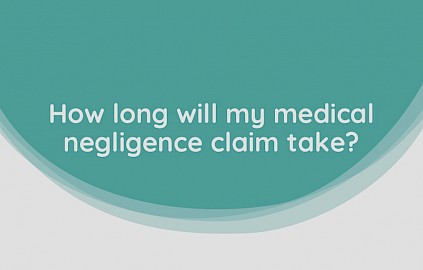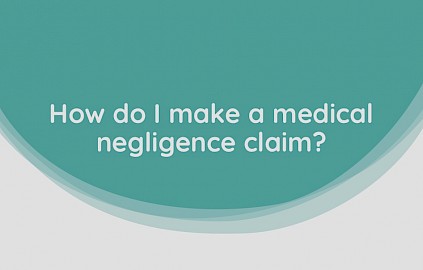Lung cancer is the third most common cancer in the UK, with the highest mortality rate, making it crucial that cases are diagnosed and treated as quickly as possible to improve the chance of survival. If you or a loved one has suffered as a result of a late diagnosis, misdiagnosis, mistreatment or any kind of medical negligence, you may wish to make a lung cancer claim.
What Are Lung Cancer Claims?
Much like any other cancer negligence claim, lung cancer claims are legal actions that patients or their families take against medical professionals who have inflicted avoidable physical or mental harm onto their patients as a result of their failing to meet the expected standard of care. In most cases, the patient will submit their own claim. However, if the patient lacks mental capacity, is under the age of 18, or has passed away, a loved one may claim lung cancer compensation on their behalf.
For more detailed information on the process, please refer to our complete guide to cancer misdiagnosis claims.
When Can You Make Lung Cancer Claims?
Lung cancer claims are time-sensitive and must be made within three years of the patient experiencing medical negligence. While you may be able to waive this time limit by submitting a Section 33 of the Limitation Act 1980 application if there were circumstances preventing you from making a claim, in most cases, courts will “time bar” claims made after three years.
We recommend that you start the lung cancer claims process as soon as you or a loved one suspects that medical negligence has taken place. You may wish to contact Medical Solicitors if one of the following instances of lung cancer negligence applies to you:
- A GP or consultant was dismissive about your symptoms, delaying your diagnosis or misdiagnosing you with a less serious condition.
- Appointments for investigations were late or kept being cancelled and rearranged through no fault of the patient.
- Test results were misinterpreted, or your medical records are inaccurate.
- Cancer treatment was mismanaged, including undergoing treatment without being informed of the risks or unnecessarily receiving treatment for a misdiagnosed condition.
To secure your lung cancer compensation claim, you will be expected to prove that any of these circumstances took place at some point during your cancer care. You will also have to provide evidence of how these circumstances have impacted your life post-treatment and how the extent of your suffering with lung cancer could have been prevented had your doctor acted differently.
What Happens When You Make a Lung Cancer Claim?
If you have decided that you want to make a lung cancer claim, you should get in touch with one of our specialist solicitors as soon as possible for a free initial consultation.
During this consultation, a member of our team will assess your case to establish how your medical duty of care was breached during your cancer treatment and the extent of your suffering as a result of the lung cancer negligence.
From there, our solicitors will begin the process of collecting medical evidence, including any scans or X-rays that may be relevant to your lung cancer claim, which prove how the negligence that you experienced has directly caused you harm or suffering. After obtaining all relevant medical records, we then seek opinions from reputable medico-legal experts on the issues in the case.
Case Studies from Successful Lung Cancer Claims
We handled a particularly complex lung cancer claim where our client was told that she had a deadly form of cancer with a dismal survival rate. We instructed multiple medical experts, including a distinguished Professor of Histopathology, to review the tissue samples from her surgery, and he reported that the diagnosis was incorrect because of negligent interpretation of biopsy specimens.
Our client was actually suffering from a form of cancer with much longer survival rates and had undergone numerous radical and life-altering treatments unnecessarily.
Do You Have a Lung Cancer Claim?
If you or a loved one has experienced lung cancer negligence, it is likely that you have already incurred financial losses as a result of your mistreatment and may be worried about the cost of pursuing a claim. At Medical Solicitors, we conduct all of our cancer claims under Conditional Fee Agreements, otherwise known as ‘No Win, No Fee’ agreements, to ensure that our clients can pursue lung cancer compensation without worrying about whether they can afford the process.
If misdiagnosis has delayed or unnecessarily complicated your cancer treatment, or any other form of lung cancer negligence has impacted the quality or length of your life, do not hesitate to contact our team of specialist solicitors for a free consultation about your lung cancer claim.
FAQs for Lung Cancer Claims
What is the payout for lung cancer claims?
The amount of compensation for lung cancer claims will depend on the extent of your injuries and how your life has been affected or shortened as a result of the negligence.
Your lung cancer compensation should cover any expenses that you have incurred following your mistreatment. This includes financial expenses, such as the cost of continuing treatment, making modifications to your home and loss of earnings for a family member who has sacrificed their job to care for you, as well as emotional expenses, such as ruined holidays or relationship breakdowns. Refer to our payout guide for more information.
What causes lung cancer?
Lung cancer is caused by harmful chemicals known as carcinogens entering your bloodstream and mutating your normal cells into cancerous cells. As the cancerous cells multiply, they form tumours in your lungs that affect your lung function and will spread to other parts of your body if left untreated.
Cigarette smoking is responsible for over 7 out of 10 cases of lung cancer. However, accidentally inhaling, ingesting or coming into contact with other industrial chemicals, such as asbestos and radon, can cause lung cancer in non-smokers.
What are the symptoms of lung cancer?
While most medical professionals identify lung cancer from a persistent cough and shortness of breath, other symptoms include swollen lymph nodes, irregular masses in your abdominal area, losing weight and general loss of appetite.
What are common misdiagnoses for lung cancer?
Lung cancer can present in various different ways, and its symptoms can sometimes be misinterpreted as less severe or even routine respiratory conditions. Some of the most common conditions that lung cancer is misdiagnosed as are:
- Asthma – Coughing, wheezing and shortness of breath are early symptoms of lung cancer that can be misdiagnosed as asthma.
- Tuberculosis – Loss of appetite and weight loss are symptoms shared by lung cancer and tuberculosis, as are chest pains, fevers, and fatigue.
- Sarcoidosis – Shortness of breath, chest pains and continuous coughs could similarly be misdiagnosed as sarcoidosis, as could the fatigue and unexplained weight loss that occur in either disease.
In cases of suspected tuberculosis or sarcoidosis, your GP or specialist consultant should request that biopsies be undertaken and examined by a histopathologist to provide an accurate diagnosis.
Where can you get support for lung cancer?
Whether you or a loved one is currently living with lung cancer or you are grieving the loss of someone to lung cancer, you may need practical, emotional, or financial advice and support. With this in mind, we have collated the contact information of numerous lung cancer support services to aid your situation.









